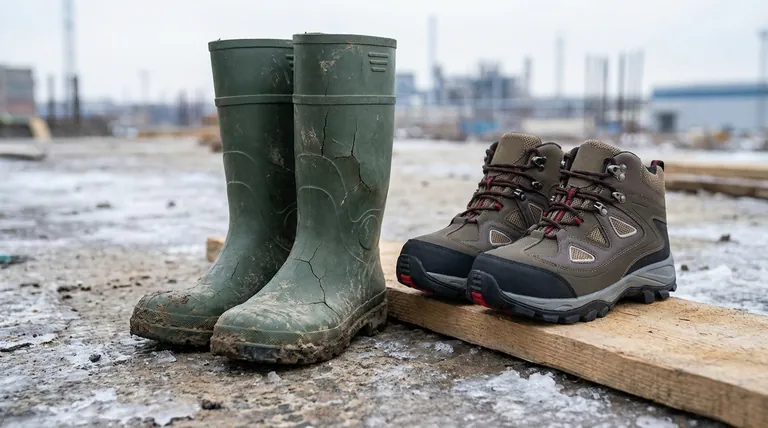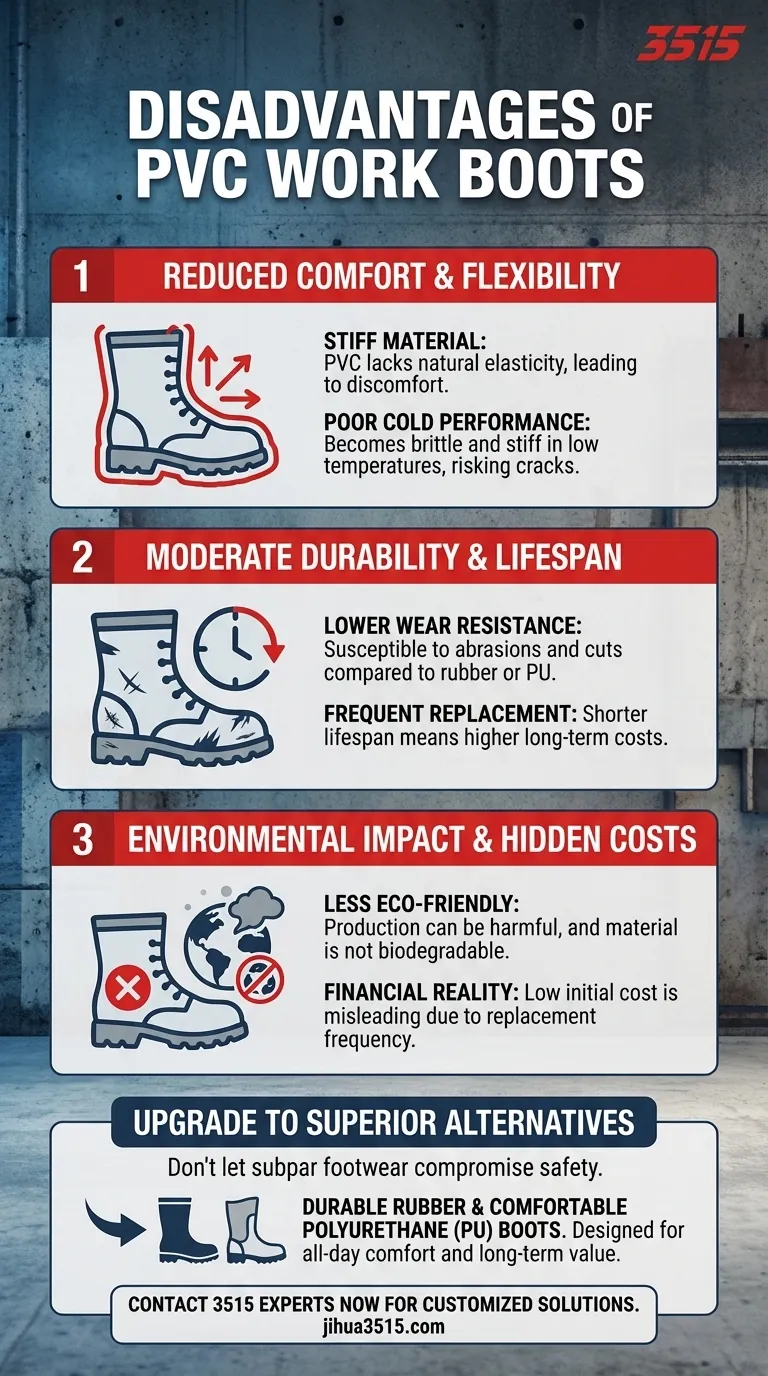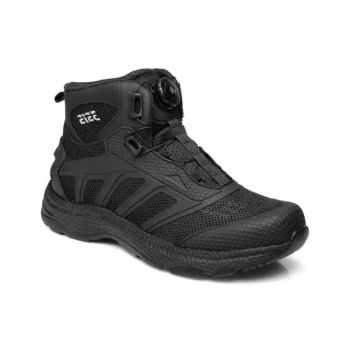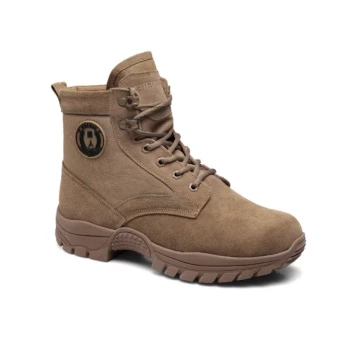The primary disadvantages of PVC work boots are their reduced long-term comfort, moderate durability, and negative environmental impact. Compared to materials like rubber or polyurethane (PU), PVC is less flexible and elastic, which can lead to discomfort during extended wear, and its lower wear resistance results in a shorter operational lifespan.
While PVC work boots offer an affordable and highly waterproof solution, this comes at a significant trade-off in durability, long-term comfort, and performance in cold weather.

The Core Limitations of PVC as a Boot Material
Understanding the inherent properties of Polyvinyl Chloride (PVC) is key to recognizing why it falls short in certain demanding work environments.
Reduced Flexibility and Comfort
PVC is a relatively rigid polymer. This lack of natural elasticity means the boots don't flex as easily with your foot's movement, which can become uncomfortable over a long workday.
While some models incorporate features like cushioned insoles, the base material's stiffness remains a core limitation for all-day wear.
Moderate Durability and Lifespan
The wear resistance of PVC is not as robust as that of rubber or PU. It is more susceptible to abrasions, cuts, and general deterioration from heavy use.
This means that while the initial cost is low, PVC boots often have a shorter lifespan and require more frequent replacement in demanding jobs.
Poor Performance in Cold Temperatures
A significant drawback of PVC is its reaction to cold. As temperatures drop, the material becomes increasingly stiff and brittle.
This not only makes the boots highly uncomfortable but also increases the risk of the material cracking, compromising their waterproof integrity.
Understanding the Trade-offs: Cost vs. Performance
Choosing PVC is a decision based on balancing immediate cost against long-term performance and other factors.
The Appeal: Low Cost and Waterproofing
The main advantages of PVC boots are clear: they are inexpensive, lightweight, and 100% waterproof.
For tasks requiring basic water protection without constant, heavy-duty use, PVC provides an effective and budget-friendly barrier against moisture.
The Hidden Cost: Environmental Impact
The production process for PVC can generate harmful substances, and the material itself is not biodegradable. This makes it a less environmentally friendly choice compared to natural rubber.
The Financial Reality: Replacement Frequency
The lower initial purchase price can be misleading. Due to their moderate durability, you may need to replace PVC boots more frequently than a pair made from more robust materials, potentially negating the upfront savings over time.
How to Apply This to Your Project
Your specific work environment and duration of wear are the most critical factors in determining if PVC is the right choice.
- If your primary focus is a low budget for infrequent, wet-condition tasks: PVC is a perfectly viable and cost-effective solution for keeping your feet dry.
- If your primary focus is all-day comfort and long-term durability: You will be better served by investing in boots made from high-quality rubber or polyurethane.
- If your primary focus is working in cold or high-abrasion environments: Avoid PVC, as it will likely fail prematurely and cause significant discomfort.
Ultimately, choosing the right boot means matching the material's properties to the demands of your job.
Summary Table:
| Disadvantage | Key Impact |
|---|---|
| Reduced Flexibility | Less comfort during long shifts, stiff feel. |
| Moderate Durability | Shorter lifespan, higher replacement frequency. |
| Poor Cold Weather Performance | Becomes brittle and uncomfortable in low temperatures. |
| Environmental Impact | Less eco-friendly production and disposal. |
Don't let subpar footwear compromise your team's safety and productivity.
As a large-scale manufacturer, 3515 produces a comprehensive range of high-performance work boots for distributors, brand owners, and bulk clients. We offer superior alternatives to PVC, such as durable rubber and comfortable polyurethane (PU) boots, designed for all-day comfort and long-term value.
Upgrade your workforce's footwear today. Contact our experts now for a customized solution that meets your specific needs and budget.
Visual Guide

Related Products
- Safety Footwear Wholesale Manufacturer for Custom OEM/ODM Production
- Wholesale Safety Footwear Manufacturer for Bulk & Custom OEM Orders
- Heavy-Duty Waterproof Nubuck Safety Boots Safety Shoes for Bulk Supply
- Premium High-Cut Waterproof Safety Boots Manufacturing & Wholesale Solutions
- Premium Grain Leather Safety Boots for Bulk Supply
People Also Ask
- What is the primary purpose of soft-toe boots? Prioritize All-Day Comfort & Agility
- Why is Goodyear welt construction preferred for work boots? For Unmatched Durability & Repairability
- What is Stitch-down Construction in work boots? Discover the Ultimate Durability and Stability
- What are the advantages of specialty protective boots in emergency rescue? Optimize Rail Transit Safety & Command
- Why should employers require high-quality work-safe boots? Boost Safety & Productivity Now
- What should wildland firefighters consider when purchasing new boots? Ensure Safety & Performance on the Fireline
- What was the common practice regarding boot maintenance in certain career fields? A Pragmatic Two-Boot System
- How do work boots protect against common construction hazards? A Guide to Essential Foot Safety



















